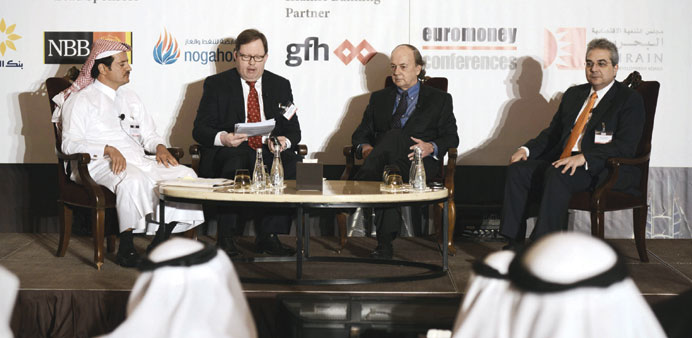From left: Director of research and monetary policy of the Qatar Central Bank, Khalid Alkhater; chief economist of Bahrain Economic Development Board, Jarmo Kotilaine; chief global strategist of West Shore Funds, James Rickards and GCC regional director of Ashmore Group, John Sfakianakis, take part in the 4th Gulf Co-operation Council (GCC) Financial Forum in Zallaq, south of Manama yesterday. GCC governments were investing too much in “supply-side” projects, such as real estate developments, rather than “demand-side” initiatives and human capital, Alkhater said.
Reuters/Manama
Gulf Arab countries have so far failed to diversify their economies away from oil revenue, a senior Qatar central bank official said yesterday.
The comments by Khalid Alkhater, the Qatar Central Bank’s director of research and monetary policy, were frank public comments by a senior official of economic policy-making in the six-nation Gulf Co-operation Council.
They reflected concern in the region about the impact of the plunge of oil prices since last year, even though GCC oil exporters’ huge fiscal reserves mean they face no immediate threat and can continue heavy state spending.
“GCC economies have failed in diversifying their economies away from oil revenue so far,” Alkhater said in a panel discussion at an economic conference in Bahrain. He reiterated previous comments, made in a research paper seen by Reuters last month, that GCC economies should rethink their monetary policies and the long-term sustainability of their currency pegs to the US dollar.
Bankers in the Gulf do not expect any change in the foreseeable future to the currency pegs, which are not under major market pressure despite the oil price tumble.
Speaking at the same conference, Bahrain’s central bank governor Rasheed al-Maraj said there would be risks for the GCC if it changed monetary policy and operated more independently from the US.
“If we have a volatile and unpredictable exchange rate, it will affect investment flows in the country...from local speculators on the currency,” al-Maraj said. He later told Reuters, “I can only speak for Bahrain but we are committed to” the country’s dollar peg.
But Alkhater argued that the pegs would have to be reviewed in the longer term if economic imbalances grew. He said GCC governments were investing too much in “supply-side” projects, such as real estate developments, rather than “demand-side” initiatives and human capital.
“If the oil price is at $60 for a prolonged period of time, the GCC will be adversely impacted,” Alkhater told Reuters, though he added that the impact for each economy would depend on the extent of its oil dependence and size of fiscal reserves.
“If low oil prices persist for a prolonged period, it will present challenges to fiscal sustainability and put pressure on social spending programmes adopted by some GCC countries in the wake of the Arab Spring revolution and, therefore, there may be political challenges,” he said.
Since the 2011 uprisings in some Arab countries, GCC governments have poured billions of dollars into welfare spending.
Commercial bank lending in Bahrain is expected to pick up after a slump, and the plunge of oil prices is not hurting liquidity in the banking system, al-Maraj said.
Domestic assets of banks in Bahrain shrank 4% from a year earlier in November, the most recent month for which data is available. Lending to the private sector fell 6%, its seventh decrease in a row and the biggest monthly drop in the series.
However, Maraj told reporters at an economic conference: “Overall lending may be dropping because of repayment, but the underlying growth in consumer lending and some of the corporates are still doing well.
“In view of some of the big projects coming on stream in a year or so, I think this will start picking up.”

